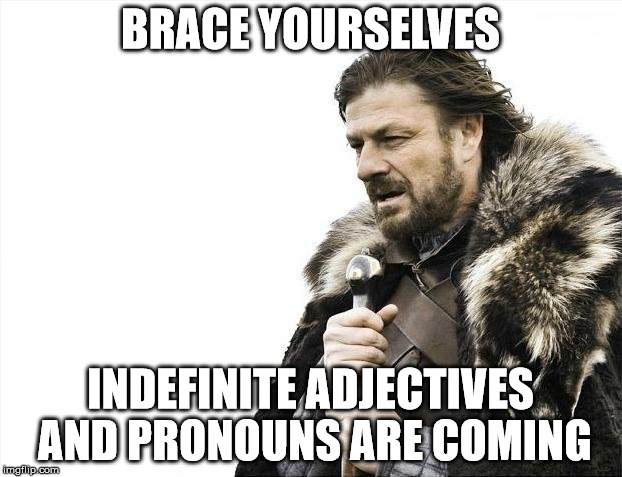Indefinite adjectives and pronouns can be quite tricky since they are used in differently different languages, even though most of them have literal translations. Let’s take a look at how to say any, each, no, some, none, every, other, another, all, nothing and a few others.

- Alguém – somebody/anybody: used in affirmative and interrogative sentences.
- Tem alguém no banheiro? – Is there anybody in the bathroom?
- Eu conheço alguém que pode te ajudar. – I know somebody who can help you.
- Ninguém – anybody/nobody/no one: used in negative sentences or negative idea.
- Não tem ninguém em casa. – There is nobody home.
- Ninguém foi à festa de aniversário da Marta. – No one went to Marta’s birthday party.
- Algum (a) s) – some/any: can vary according to number and gender (algum, alguns, alguma, algumas).
- Alguns dos meus livros são mais velhos do que eu. – Some of my books are older than me.
- Você tem alguma ideia onde eu posso comprar um canivete? – Do you have any idea where I can buy a penknife?
- Nenhum (a) – none/no/any: can vary according to gender (nenhum, nenhuma), it is used in negative sentences or negative ideas.
- Eu não tenho nenhum – I don’t have any money.
- Luisa não recebeu nenhuma mensagem sobre o assunto. – Luisa did not get any messages on the subject.
- Qualquer – any: always followed by a noun.
- Eu faria qualquer coisa por ele. – I would do anything for him.
- – Qual filme você quer ver? / – Qualquer um… – – Which film would you like to watch? / – Any film…
- Todo (a)(s) – every/all: can vary according to number and gender (todo, todos, toda, todas), it is always followed by a noun.
- Natália comeu todas as laranjas. – Natália ate all the oranges.
- Meu filho gosta de todo mundo na escola. – My son likes everybody in school.
- Tudo – everything/every/all: there is no plural form or any other variation, it is not followed by a noun.
- Meu cachorro come tudo que vê pela frente – My dog eats everything he sees.
- Outro (a)(s) – other/another: can vary according to number and gender (outro, outros, outra, outras).
- Não posso ir, tenho outras coisas para fazer. – I can’t go, I have other things to do.
- Marcus comprou outro – Marcus bought another car.
- Nada – nothing: there is no plural form or any other variation, it us used in negative sentences or negative idea.
- Não entendo nada de computador – I know nothing about computers.
- Não tem nada que eu possa fazer. – There is nothing I can do.
- Cada – each: there is no plural form or any other variation
- Cada aluno deve apresentar seu projeto amanhã. – Each student has present their project tomorrow.
- Sou mais feliz a cada – I am happier each day.
Boa semana à todos e à todas!





